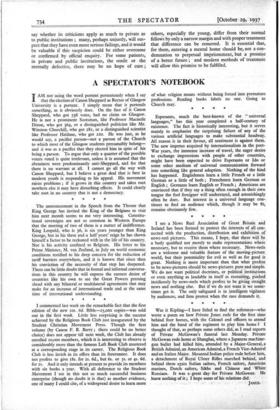Esperanto, much the best-known of the " universal languages," has
this year completed a half-century of existence. The fact is historically interesting, but it serves mainly to emphasise the surprising failure of any of the various artificial languages to make substantial headway. All reason is in their favour, all sentiment is against them. The new impetus acquired by internationalism in the post- War years, the immense increase of travel, the eager desire to exchange impressions with people of other countries, might have been expected to drive Esperanto or Ido or some other medium of universal communication forward into something like general adoption. Nothing of the kind has happened. Englishmen learn a little French or a little German or a little of both ; Frenchmen learn German or English ; Germans learn English or French ; Americans are convinced that if they say a thing often enough in their own tongue the fool foreigner will understand, and astonishingly often he does. But interest in a universal language con- tinues to find an audience which, though it may be fit, remains obstinately few.


























































 Previous page
Previous page